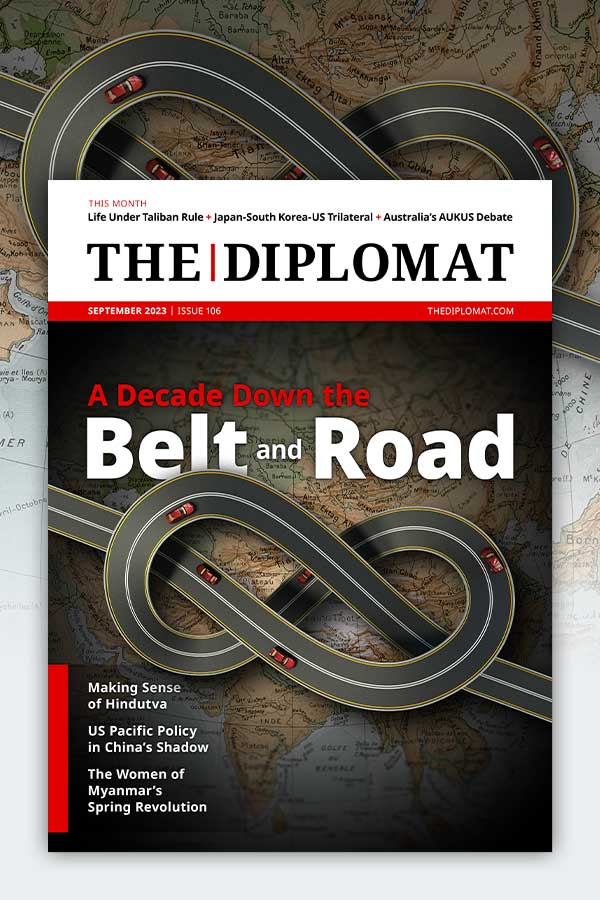| Welcome to the latest issue of Diplomat Brief. This week our top story explores how Chinese strategists are viewing the use of landmines in Ukraine, with an eye toward a Taiwan conflict. We also have an interview with Alexander Vuving, a professor at the Daniel K. Inouye Asia Pacific Center for Security Studies, on what motivated the U.S.-Vietnam diplomatic upgrade. |
| Story of the week | ![[object Object]](https://thediplomat.com/diplomat-brief/2023/vol39/images/feature.jpg) | Security Landmines in Ukraine: Lessons for China and TaiwanWhat Happened: Since Russia began its full-scale invasion of Ukraine in February 2022, Chinese military strategists have been watching closely to see what lessons can be gleaned – and potentially applied to a Chinese invasion of Taiwan. One recent article by Chinese analysts looks specifically at the use of landmines in the ongoing Russia-Ukraine War. Specialists believe mining, whether at sea or on land, could play a major role in a Taiwan continency. Our Focus: The Chinese analysts came to the conclusion that laying mines has worked effectively – first for Ukraine, to delay the Russian advance, and currently for Russia, to slow Ukraine’s counteroffensive to a crawl. “Landmines…as everyone knows, are easy to sow, but hard to remove,” the authors declared. PLA planners could be unnerved by this conclusion, since it hints at the difficulties of the kind of rapid maneuver warfare that has long been envisioned for any hypothetical Chinese strike against Taiwan. What Comes Next: Taipei, naturally enough, is also studying the Ukraine War for applicable lessons and it is likely not at all coincidental that it just placed a major order in July 2023 for rapid mine-laying vehicles from Northrop Grumman that are quite similar to the types discussed above. Meanwhile, China is practicing de-mining operations, including developing a prototype unmanned system for this purpose. That suggests both sides are eyeing the use of mines in a potential cross-strait conflict – but let’s hope that day never comes. Read this story |
| Behind the News | INTERVIEW Alexander VuvingDr. Alexander Vuving, a professor at the College of Security Studies at the Daniel K. Inouye Asia Pacific Center for Security Studies, says there’s more to the U.S.-Vietnam upgrade than China: “[I]f only for Beijing’s assertiveness, Hanoi would have insisted on a ‘normal’ upgrade by one notch to a ‘strategic partnership.’ What really convinced the Vietnamese to ‘leapfrog,’ I think, is the U.S. offer to turn Vietnam into a major high-tech and semiconductor hub in the U.S.-friendshored supply chains.” Read the interview |
| This Week in Asia | Northeast Asia South Korea’s Opposition Leader Faces ArrestLate last week, South Korea’s National Assembly voted to allow prosecutors to seek the arrest of Democratic Party leader Lee Jae-myung, who ran against current President Yoon Suk-yeol in the 2022 election. Given the Democratic Party’s control of the National Assembly, that means over two dozen members of his own party voted to lift the immunity Lee enjoyed as a sitting legislator. Several different investigations into Lee have polarized the country between those who see a witch hunt against Yoon’s biggest rival and those who believe there is real cause to suspect Lee of corruption. Find out more | South Asia Maldives’ Presidential ElectionOn September 30, Maldivians will vote in a run-off election to determine their next president, resulting in either another term for incumbent President Ibrahim Solih or a new administration under Malé Mayor Mohamed Muizzu. As always in Maldives’ run-offs, the role of kingmaker could go to the third place party in the last round – The Democrats of Mohamed Nasheed, a former ally of Solih who joined forces with the opposition. While Maldivians are, like voters around the world, primarily driven by domestic concerns, the outcome of Saturday’s poll will have big geopolitical implications. Find out more | Southeast Asia Philippines, China Tangle at Scarborough ShoalThe Philippine Coast Guard (PCG) claimed this week that it had removed a “floating barrier” that Chinese vessels installed at a disputed shoal in the South China Sea, the latest maritime confrontation between the two nations. On September 22, PCG personnel discovered the 300-meter-long barrier of rope and nets, which it reported were put in place by the China Coast Guard to block Filipino fishermen from entering the shoal’s central lagoon. Describing the move as “a clear violation of international law,” the PCG launched a “special operation” to remove it on Sunday. Lying around 200 kilometers west of Luzon Island, well within the Philippines’ exclusive economic zone, Scarborough Shoal was occupied by Chinese vessels following a protracted standoff in 2012. The disagreement over the barrier is the latest in a string of incidents involving the Philippine and Chinese coast guards since the beginning of the year. Find out more | Central Asia After the Central Asia-US Leaders’ SummitLast week’s first-ever summit between a U.S. president and his five Central Asian counterparts was significant mostly because it happened at all. The political and ideological gulf between the United States and Central Asia is vast, a reality illustrated by the conspicuous absence of human rights and democracy issues in Washington’s regional priorities despite the administration’s pushing of such narratives elsewhere. The summit had no red carpet, as was rolled out in Xi’an for the China-Central Asia summit, but it marked a degree of recognition by the U.S. of Central Asia’s critical position that the region has long sought. Find out more |
| Visualizing APAC |  | A Bajau community living on stilt homes and houseboats off the shores of Malaysia’s Pulau Bodgaya. Most, if not all, of these Bajau families moved to Malaysia from the Philippines at some point; hence they are considered stateless. See the full picture |
| Word of the Week | Economy 农家乐Nóngjiālè, Mandarin for “homestays,” or rural houses that also provide lodging for tourists. Find out more |
|  |

![[object Object]](https://thediplomat.com/diplomat-brief/2023/vol39/images/feature.jpg)

